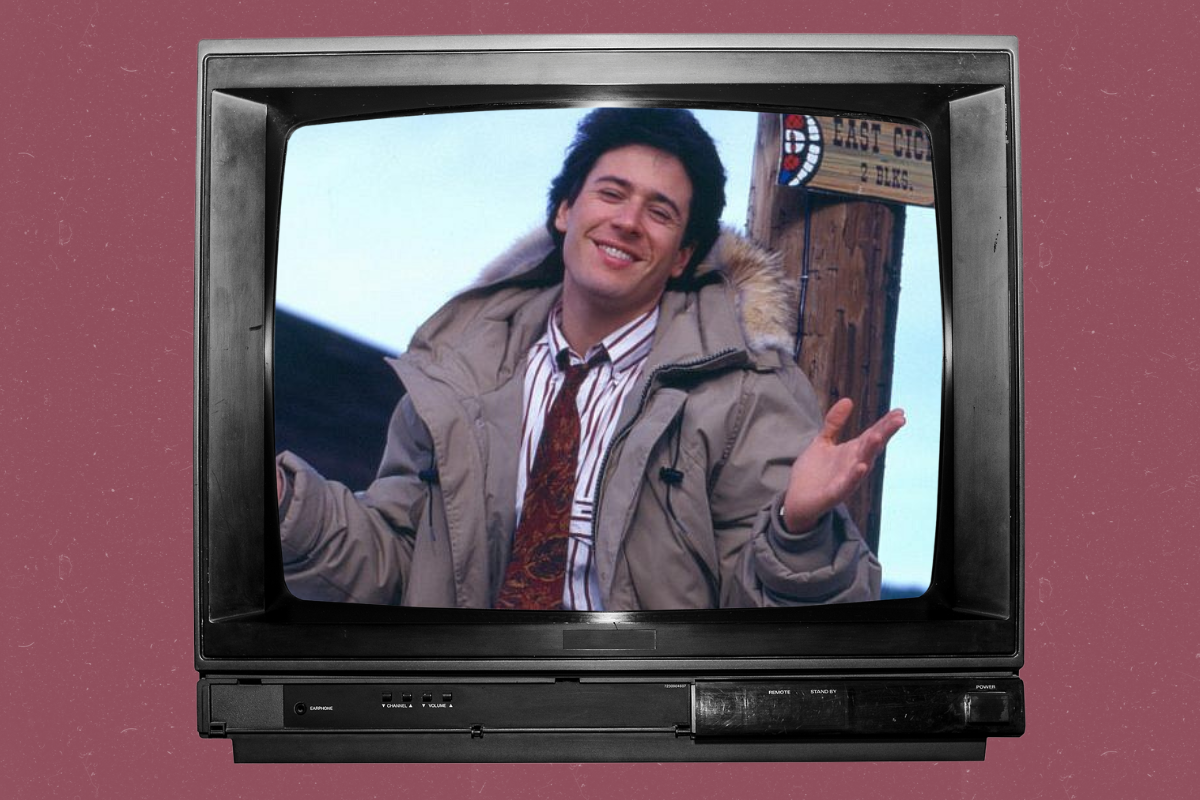Before a sort of golden age of Jewish characters on television starting in the mid-90s (Monica and Ross Geller on “Friends” and Fran Fine, the titular character of “The Nanny,”) and in the 2000s (“New Girl”’s Schmidt and “The Goldbergs”), you would have been hard pressed to find any on the networks or cable. Which is why it’s such a surprising delight that in the opening seconds of the July 1990 pilot of “Northern Exposure,” the overt Jewishness of the show and its protagonist, the very New York Dr. Joel Fleischman, is established immediately. Thirty years later the show is available for long-time fans to enjoy again, and for new generations to discover on Amazon.
“Northern Exposure” begins with a scene that establishes both the set-up for the plot and a clear depiction of Flesichman’s proud Jewish identity. The doctor lists to his flight seatmate the reasons why his destination, Anchorage, isn’t so bad, including “two practically Kosher delis.” He goes on to explain that only one scholarship application got a response because “let’s face it, Jewish doctors are not exactly an endangered species,” and that it was the state of Alaska that funded his medical degree. In exchange for ponying up $125K (medical school was a whole lot cheaper in the 80s), he’s been conscripted to work as a doctor in the 49th state for the next four years. For good measure, when the guy next to him pointedly asks if he’s ever been there, Fleischman says, “Of course, what kind of a schmuck do you think I am?!”
“Northern Exposure” was a fresh and funny take on the fish-out-of-water trope from creators Joshua Brand and John Falsey (“St. Elsewhere”). The series was also a much-needed addition to my one-of-these-things-is-not-like-the-other day to day. Canadian-born, I spent my adolescence in small town Wisconsin, where I was the only Jewish kid in my grade school (my mother made annual presentations to my class about different Jewish holidays with props, like a menorah or a box of coconut macaroons), literally and liberally took the commandment to drink four cups of wine during seders very seriously (Manischewitz was the only option, but to a tween’s palate, the extra sweet wine was delicious), and was one of only three Jewish kids in my high school. Like a Hanukkah miracle though, despite the plethora of churches, we did actually have a synagogue and rabbi. I got out of class for High Holidays but also had to deal with teachers who had never met a Jewish person before me.
For five of the show’s six seasons, major heartthrob Rob Morrow played Fleischman and brought a neurotic but menschy energy to the surroundings and suffused the show with a constant low hum of Jewishness. I didn’t remember all the ways “Northern Exposure” had explored Judaism and conducted a little investigation, re-watching the holiday episode “Seoul Mates.” The good doctor is offered a Christmas tree, but politely rebuffs his friend, the ever congenial Ed (Darren E. Burrows). Giving the audience a window into his childhood, he tells him, “Next to the cross, you can’t get any more Christian than that… Herb and Nadine Fleischman would rather be flayed alive than allow so much as a candy cane — let alone a full-blown Christmas tree — into their home.” But after thinking about it, he gets a massive tree and from there, his spiritual, moral and philosophical crises unfold. It’s a great pleasure to watch as Fleischman goes from rationalizing to feeling judged to an understanding, and the debate he has with himself will resonate with any Jewish adult who experienced some Christmas envy as a kid.
It was probably not surprising, given my surroundings, that I also went through this. One of my kind and well-meaning teachers felt bad that I was deprived and brought over an artificial tree in a box. My mother, a quasi-agnostic who was permissive and hands off in so many ways, was adamant that we would not have a tree in the house. At the time I was furious, but later I was really glad she took such a vocal stand. I’ve never wanted to have a tree since. I had no idea how the episode turned out, but in the end, on Christmas Eve, a content Fleischman tells his antagonist/future love interest O’Connell (Janine Turner): “I gave it my best shot. It just didn’t work. Scratch the plum pudding, there’s a matzah ball underneath. I’m a Jew. That’s all there is to it.” Channeling a little “Charlie Brown Christmas” energy, he gifts his tree to her, bringing her some of the holiday spirit she had been missing.
Happily, I would chart a reverse-Fleischman course and move from my small town to New York, where instead of getting called “bagel” by the neighbor kid or being asked in a certain way by a new friend if I was “Jewish,” I could eat real (not frozen) bagels and lox. Even though there are less than 1.5 million Jews in New York City, here is where I have always felt most at home. Revisiting “Northern Exposure” was like getting to feast on a delicious bowl of matzah ball soup (something else I never had until I came to New York, except out of a jar!), reminding me how much bigger my life is able to be and how valuable it is to have a positive, joyful portrayal of Jewish people on television.
Late Take is a series on Hey Alma where we revisit Jewish pop culture of the past for no reason, other than the fact that we can’t stop thinking about it?? If you have a pitch for this column, please e-mail submissions@heyalma.com with “Late Take” in the subject line.




